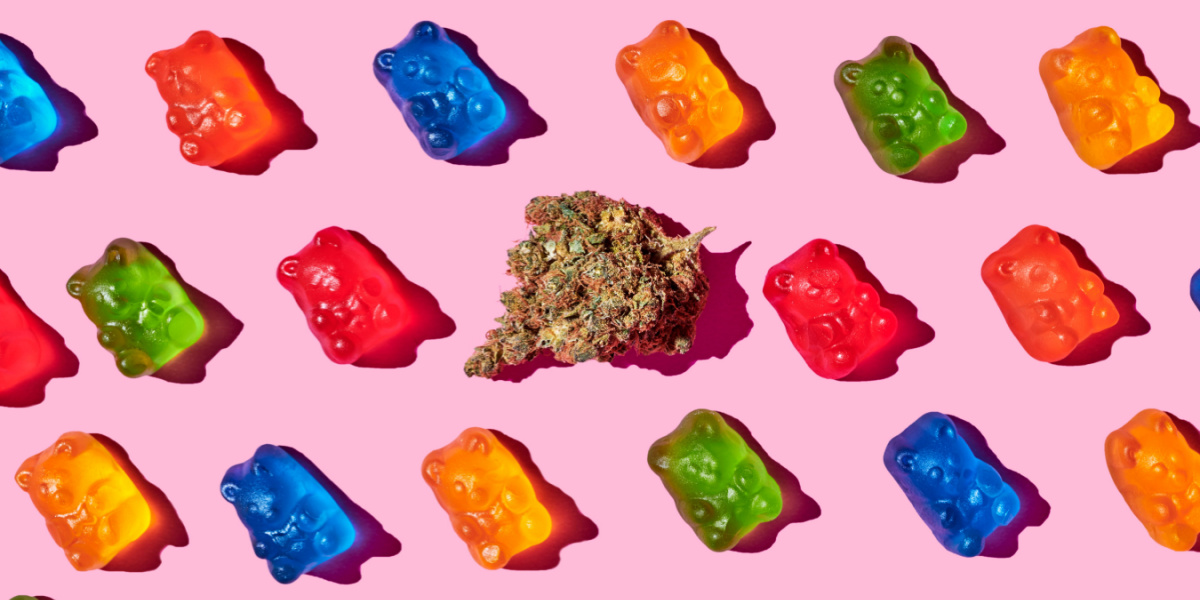CBN gummies, a form of edible made from a phytocannabinoid in the hemp plant, are starting to be commercialized for their pain relief and anti-inflammatory properties. Here we look at whether CBN gummies have these reported effects; explaining what CBN is, how it interacts with the human brain, and any known potential risks.

What are CBN gummies?
CBN gummies are edibles made from cannabinol (CBN). CBN is one of over one hundred cannabinoids in the Cannabis Sativa plant.[1] These natural, plant-based compounds have different shapes and forms, meaning they interact differently with brain receptors and neurotransmitters. Consequently, they produce different results.
For example, tetrahydrocannabinol (THC), the primary substance in marijuana, generate more intense psychoactive effects than cannabidiol (CBD) and cannabinol (CBN) edibles.[2] The absence of acute psychoactive effects coupled with registered benefits has led to some states legalizing marijuana and CBD in certain products.
Items ranging from CBD oils and shampoos to gummies are used for skin care, weight management, chronic pain, anxiety, and insomnia. CBN-based products are not so popular and do not have a well-defined legal status because they are still under research. However, CBN gummies are becoming more popular for their potential positive effects on pain and sleep issues.
Why do people take CBN?
The data surrounding CBN is still in the early stages, but preliminary findings showcase CBN’s potential sedative effects, with more research still required to ascertain these properties.[3] Therefore, CBN gummies and other products may trigger a feeling of drowsiness and relaxation. Additionally, CBN has the potential to reduce inflammation in the body and, therefore, support people’s immune systems.[4]
The positive effects on the body include:
- Fighting insomnia
- Pain management
- Increased appetite
- Immune support by reducing cytokines[5]
- Relief from Attention-deficit/hyperactivity disorder (ADHD) symptoms[6]
- Reduced tumor growth[7]
- Glaucoma treatment[8]
The reason behind these effects is CBN’s mechanism of action inside the brain. First, CBN is a by-product of aging THC, and studies show that aged cannabis has potential sedative effects.
Secondly, CBN interacts with the body’s endocannabinoid system (ECS), which regulates several physiological and cognitive processes, including pain, mood, and sleep. The ECS features two primary receptors, CB1 in the central nervous system and CB2 in the peripheral organs and cells that are part of the immune system.[9]
The CBN from CBN gummies primarily binds to CB2 receptors, though they can also attach to CB1 receptors.[5] As a result, CBN facilitates the release of certain neurotransmitters that influence communication between neurons, thus changing the brain’s response to pain and inflammation.
What's the difference between CBN and CBD?
CBD and CBN are phytocannabinoids from Cannabis Sativa, the marijuana or hemp plant. However, they have different origins and chemical structures, and, therefore, their effects on the human body differ.
For example, CBD is directly derived from the hemp plant, whereas CBN is a byproduct of THC degradation after exposure to oxygen and heat.[2]
CBD is also entirely non-psychoactive, meaning it lacks the “high” feeling associated with marijuana. Conversely, CBN is considered non-intoxicating but might have mild psychoactive effects in large quantities or in combination with other drugs.[2]
The two substances also differ in terms of potential therapeutic benefits. Anecdotal and experimental evidence on CBD indicates anti-inflammatory, anti-anxiety, and neuroprotective properties, whereas preliminary research on CBN indicates sedative and anti-inflammatory properties. More research is required in both cases.[2]
Lastly, CBD products are more popular and readily available in oils, tinctures, edibles, and topicals. CBN is less widespread, but more products like CBN gummies are emerging, especially in the sleep management niche.[2]
Does CBN get you high?
Although its cousin CBD does not produce psychoactive effects, large quantities of CBN or combinations with other drugs might lead to a mild sensation of “high.”
The differences between these two substances lie in their distinct chemical structures and their interaction with the endocannabinoid system.
For example, CBD has a low affinity to CB1 receptors in ECS, meaning it does not stimulate them. This antagonistic property explains CBD’s non-psychoactive nature. By comparison, CBN has a higher affinity to CB1 receptors, though not as high as THC compounds such as Delta-8 THC. As a result, CBN does not produce intense psychoactive effects but may trigger less steep highs.[5]
Are there any risks to using CBN?
There are no known risks or side effects to using CBN, as the research on this substance is still in its infancy. However, some adverse reactions may be inferred from its properties and other researched cannabinoids.
For example, CBN-documented sedative effects may produce risks for individuals needing to remain alert, such as those driving or operating heavy machinery. Moreover, while CBN is considered a non-intoxicating drug, its mild psychoactive effects in large doses may warrant caution, especially when taken with other substances.
Impurity concerns are an issue with most cannabinoid-based products, like CBD, which may contain less CBD and more THC than advertised or legal. Similarly, some CBN gummies may contain contaminants, such as pesticides, heavy metals, or other unwanted compounds.[2]
Additionally, the long-term effects of regular CBN use have not been thoroughly studied, so its chronic use might produce negative consequences. Other cannabinoids lead to dry mouth, diarrhea, drowsiness, mood changes, and irritability in the short term. In the long term, they can cause liver injury, possible infertility, impaired brain development, and cardiovascular issues.[1]


-guide-detail.jpg?v=1722502608)
-guide-detail.jpg?v=1722502625)
-and-gummies-guide-detail.jpg?v=1722503780)